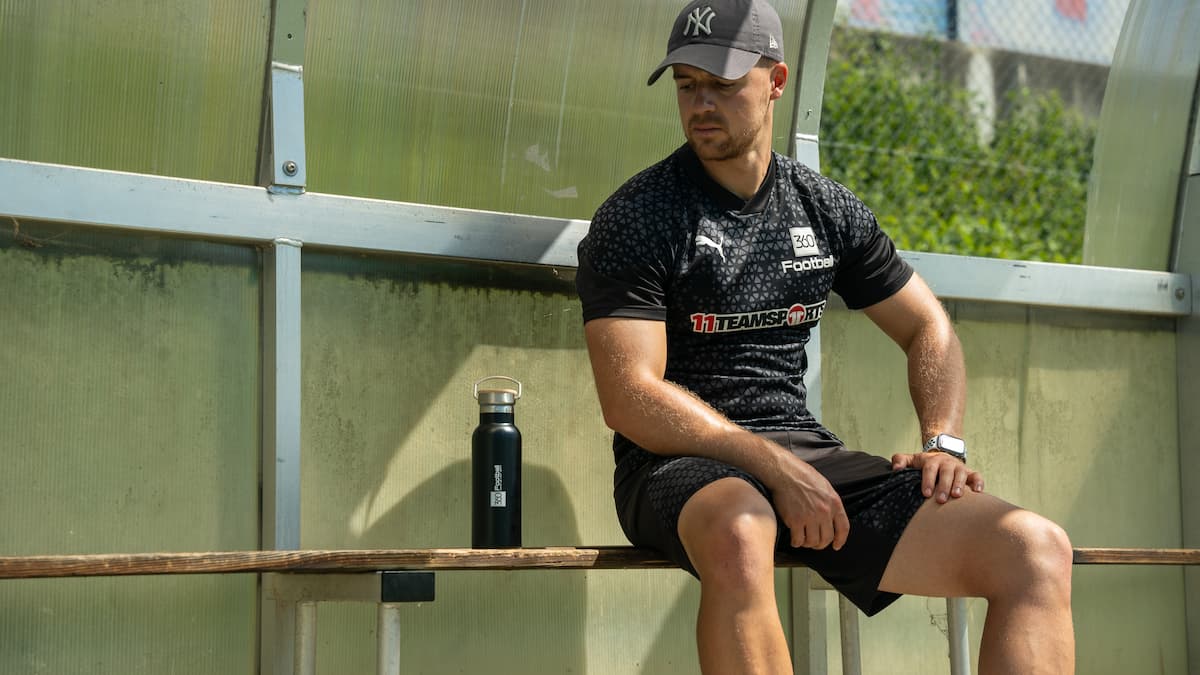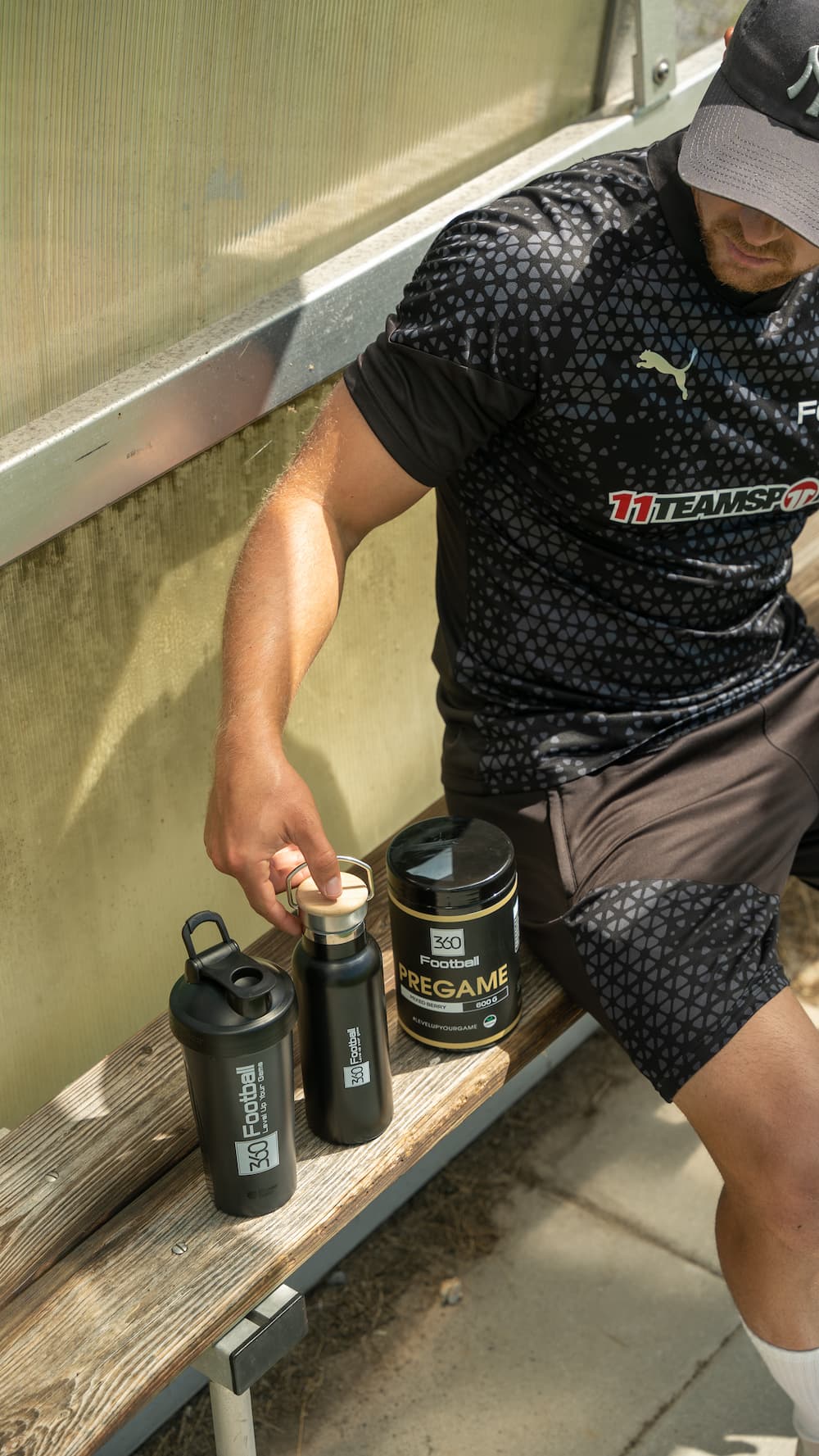What is the best thing I should eat on match day ? This is probably the most frequently asked question about nutrition among footballers. In our blog post with the topic “ The perfect match preparation - the match day ” the question was addressed: When The last meals should be eaten before the game. Now the question arises, what and how much should be eaten .
According to a UEFA expert group (Collins et al., ) On average, a field player burns between 1300-1600 kilocalories during a 90-minute game . Between 60 and 70 percent of the energy is used carbohydrates won. This makes it easy to understand that carbohydrates play the main role in this nutrition game.
Important at the start!
As we already know, carbohydrates are stored in the body in the form of glycogen. In order to maximize these stores, it is important to consume a significant amount of carbohydrates (spread throughout the day) the day before the game. The UEFA study recommends this (Collins et al., ) a daily total value of 6-8 grams of carbohydrates per kilogram of body weight during the day before the game. This is the case for a player weighing 80 kilograms 480-640 grams of carbohydrates (For example, 600-800 grams of white rice or 650-850 grams of pasta), which he should consume throughout the day.
On game day
Pre-match meal
On the day of the game itself, a daily amount of 6-8 grams of carbohydrates per kilogram of body weight recommended. The last meal before the game is particularly important 1-3 grams of carbohydrates per kilogram of body weight should be included in order to be able to go into the game with optimal conditions in the glycogen stores. We recommend carbohydrate sources with a high Glycemic index , as these can be absorbed more quickly in the body. There is pasta again or white rice certainly a good source. It is also important to have a moderate amount egg white (protein) to consume, so approximately in total 30-50 grams to stimulate muscle protein biosynthesis. In addition, the should Fat consumption kept rather low because consuming fat slows down digestion and therefore nutrient absorption.
In-match feed
What is often neglected is the consumption of carbohydrates (in drink form) during the game. This is often not taken into account up to the highest (professional) level, although it has been scientifically proven that it is Quality of shots, dribbling speed and passing accuracy can be improved by consuming 30 - 60g of carbohydrates over the course of the game. ( Harper et al., 2017) (Currell et al., 2009 ) (Ali & Williams, 2009 )
The choice is the Carbohydrate source pretty irrelevant. The only important thing is that it is supplied to the body in a quickly digestible form, such as in the form of Sugar, fructose maltodextrin (usually in isotonic drinks) combinations or in the form of Dextrose (Glucose). Since a lot of electrolytes are lost through sweat during the game, we recommend one Isotonic drink or one shortly before the game carbohydrate-containing boosters like that Pregame360 .
After the game is before the game. The ultimate goal is certainly that Glycogen stores to fill as quickly as possible to stimulate regeneration and thus lay a foundation for the coming training week. It is advisable to click on one shortly after the final whistle Recovery drink , such as this Recover360 , or small snacks.
Post-match meal
You should continue with it at the next meal carbohydrates in large quantities ( 2-4 grams of carbohydrates per kilogram of body weight) be supplied. Additionally, you need a moderate amount Protein with a good amino acid profile , like with every meal. Especially the fats can too after the game a little bit higher stand out. In addition, the current scientific situation shows that a high consumption of protein (30-60 grams), which can optimize protein synthesis overnight and thus Regeneration and building processes can run optimally in the muscles. The data shows that Casein is probably the best source of protein is.
micronutrients
Another topic that unfortunately doesn't yet exist in professional football The supply of is very important micronutrients . The UEFA expert paper highlighted this in particular Vitamin D, iron and calcium thematised. Calcium and vitamin D mainly in Bone metabolism involved. Iron plays a big role in... Blood , as it occurs specifically in hemoglobin and myoglobin. It also plays a big role in the Energy provision .
Vitamin D
The current data shows that one too deep vitamin D concentration in the body Muscle function and regeneration can inhibit football players. (Morton et al., 2012 )
Because vitamin D via skin through ultraviolet sunlight recorded the following recommendation should be interpreted differently from region to region. However, a daily intake of 2000 is recommended international Units per day in the form of one dietary supplements to take to get on the safe side to be.
iron
Since iron plays a significant role in oxidative ATP production ( provision of energy ), an appropriate amount of iron consumption is also important to ensure a optimal performance to be able to bring. A 2019 review showed that approximately 5-11% of those who participated professional football players have iron levels that are too low had in the blood . (Sim et al., 2019)
Iron recommendations vary around the world 8-9 mg per day for male athletes , 18-20 mg in females footballers . The iron should be obtained from food if possible, but it can also be of high quality Dietary supplements be resorted to. It Care should be taken to ensure that iron is included Combination with vitamin C consumed will, since this is the Recording of iron in the body can improve.
calcium
Calcium is extremely important for the Bone structure , but also for optimal Supply of skeletal muscles and for that cardiovascular system , as well as for the Nerve conduction .
The UEFA expert team (Collins et al., ) recommends a daily intake of 1500mg . This is to cope with daily physical stress and to avoid injuries or health problems to prevent problems . The following table (English) gives you an overview of which foods you should eat this one can meet your calcium needs.

(Collins et al., )
Both iron and calcium are contained in coordinated amounts in Recover360 .
So now you have one optimal basis for perfectly adapting your diet on match day and the intake of micronutrients so that you can perform at the highest level and if possible away from injuries stay. For even more knowledge, tips and football recipes, take a look at our nutrition guide .
In this sense: #LevelUpYourGame !
Sources
- Harper LD, Stevenson EJ, Rollo I, et al. The influence of a 12% carbohydrate-electrolyte beverage on self-paced soccer-specific exercise performance . J Sci Med Sports 2017;20:1123–9.)
- Currell K, Conway S, Jeukendrup AE. Carbohydrate ingestion improves performance of a new reliable test of soccer performance. Int J Sport Nutr Exerc Metab 2009;19:34–46.)
- Ali A, Williams C. Carbohydrate ingestion and soccer skill performance during prolonged intermittent exercise . J Sports Sci 2009;27:1499–508.)
- Morton JP, Iqbal Z, Drust B, et al. Seasonal variation in vitamin D status in professional soccer players of the English Premier League . Appl Physiol Nutr Metab 2012;37:798–802.)
- Sim M, Garvican-Lewis LA, Cox GR, et al. Iron considerations for the athlete : a narrative review. Eur J Appl Physiol 2019;119:1463–78.
- James Collins, Ronald John Maughan, Michael Gleeson, Johann Bilsborough, Asker Jeukendrup, James P Morton, SM Phillips, Lawrence Armstrong, Louise M Burke, Graeme L Close, Rob Duffield, Enette Larson-Meyer, Julien Louis, Daniel Medina, Flavia Meyer , Ian Rollo, Jorunn Sundgot-Borgen, Benjamin T Wall, Beatriz Boullosa, Gregory Dupont, Antonia Lizarraga, Peter Res, Mario Bizzini, Carlo Castagna, Charlotte M Cowie, Michel D'Hooghe, Hans Geyer, Tim Meyer, Niki Papadimitriou, Marc Vouillamoz, Alan McCall UEFA expert group statement on nutrition in elite football. Current evidence to inform practical recommendations and guide future research . Br J Sports Med: first published as 10.1136/bjsports-2019-101961 on 23 October.



